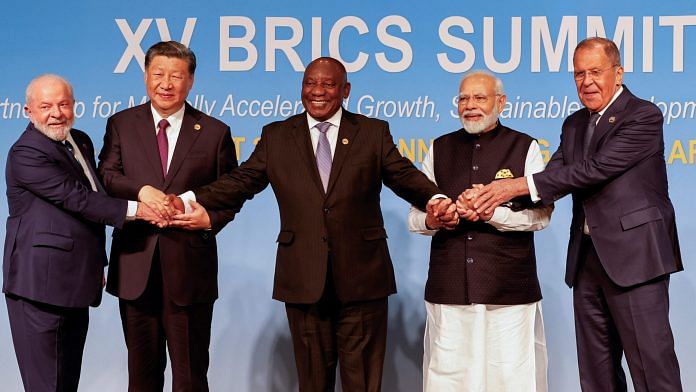The five–member BRICS summit in Johannesburg, South Africa, is poised to expand and grow into a formidable grouping of emerging economies, led by the world’s two largest economies, India and China. BRICS was always considered as a bloc established to counterbalance the West, especially after the global economic crisis of 2008-2009. The anti-West, or rather the anti-US moorings of the BRICS, were evident since its beginning. The ascendency of President Xi Jinping and China’s economic challenge to the West added a new dimension to the overall functioning of BRICS.
A series of high–level meetings involving India, Brazil, Russia, and China led to the formation of BRIC in 2009, which later expanded to include South Africa in 2010 during a meeting in New York. Ironically, after thirteen years, relations between South Africa and the Western world seem to have soured a bit. South African President Cyril Ramaphosa was part of the “Peace Team” that went to Ukraine and then Moscow to meet Russian President Vladimir Putin, whom they refused to arrest following a warrant issued by the International Criminal Court (ICC). He has also blamed colonialism and apartheid for the marginalisation of women and poor economic growth: “We in Africa as we seek to grow and develop, we are focusing on the empowerment of the women of our continent who have been held back through years of colonialism, and in our case through the years of apartheid through protocols and laws. We need to free the women of our continent so that they can trade, be in business and to grow the economies of our various countries…”
On its part, China did not miss any opportunity to hit the US from the BRICS business forum. Incidentally, while Xi skipped the meeting, his minister of commerce Wang Wentao read out a prepared statement full of jibes at the ‘hegemonic’ US. Without naming the US, the statement advised the world leaders “not to sleepwalk into the abyss of a new Cold War”. The strongly worded statement also labeled the US as a country “going out of its way to cripple the emerging markets and developing countries”. “Whoever is developing fast, becomes its (US) target of containment. Whoever is catching up becomes its target of obstruction. But this is futile,” the statement added.
Also read: On BRICS sidelines, Modi & Xi discuss LAC tensions, agree to ramp up disengagement efforts
Stay out of conflicts
It is amid all this West/US bashing that the BRICS 2023 summit must deliberate on two important points: admitting new members and de-dollarisation, both easier said than done. Admitting new members will need consensus of all five members and a detailed procedural framework. Currently, six countries — Argentina, Egypt, Ethiopia, Iran, Saudi Arabia, and the United Arab Emirates — have been invited to join the bloc whose membership will take effect from January 2024. Both India and China have taken a lead in inviting new members to this summit. Prime Minister Narendra Modi reiterated India’s stand of fully supporting expansion of the BRICS membership and welcomed moving forward with consensus; he also pitched for reform of multilateral financial institutions, the World Trade Organisation (WTO). Supporting India’s call, Xi said, “We need to…accelerate the BRICS expansion process…to pool our strengths (and) our wisdom to make global governance more just and equitable.”
Although China brokered peace between Saudi Arabia and Iran and now both would be members of BRICS, it will not be easy for the expanded bloc to deal with the US as before. Saudi Arabia will not want Iran to play any role in the matters of the Arab world. US sanctions on Iran will be a serious impediment on extending funds from New Development Bank (NDB) of BRICS for development projects in Iran. Both India and China are deeply involved in development of Chabahar Port and would require NDB funding.
Even if there is consensus on providing economic assistance to members and non-members, potential differences may arise regarding political, strategic and regional conflicts. For example, in 2011 the Palestine Liberation Organisation (PLO) asked for UN recognition of Palestine as a state. Brazil, India, and South Africa, as non-permanent members of the UN Security Council (UNSC), joined permanent members Russia and China in voting for this proposal. Notwithstanding this, Israel has expanded its economic and security links with India, Russia, and China with a view to diversify its global outreach.
Besides supplying drones to Moscow (reportedly before the Russia-Ukraine conflict), the Iranian Ministry of Defence and Armed Forces Logistics unveiled the Mohajer-10 drone capable of striking targets in Israel. The newly expanded BRICS will have to try hard to keep out of the crossfire of a likely conflict arising from Israel-Hezbollah tensions.
India appears to be fairly well placed to bring a balance between the new avatar of BRICS without antagonising the present team and at the same time keep out of its anti-West, read anti-US, fulminations. It may be a tall order but New Delhi cannot falter at this crucial juncture as it aims to take centre stage in global geopolitical and geo-economic dynamics.
Seshadri Chari is the former editor of ‘Organiser’. He tweets @seshadrichari. Views are personal.
(Edited by Prashant)



